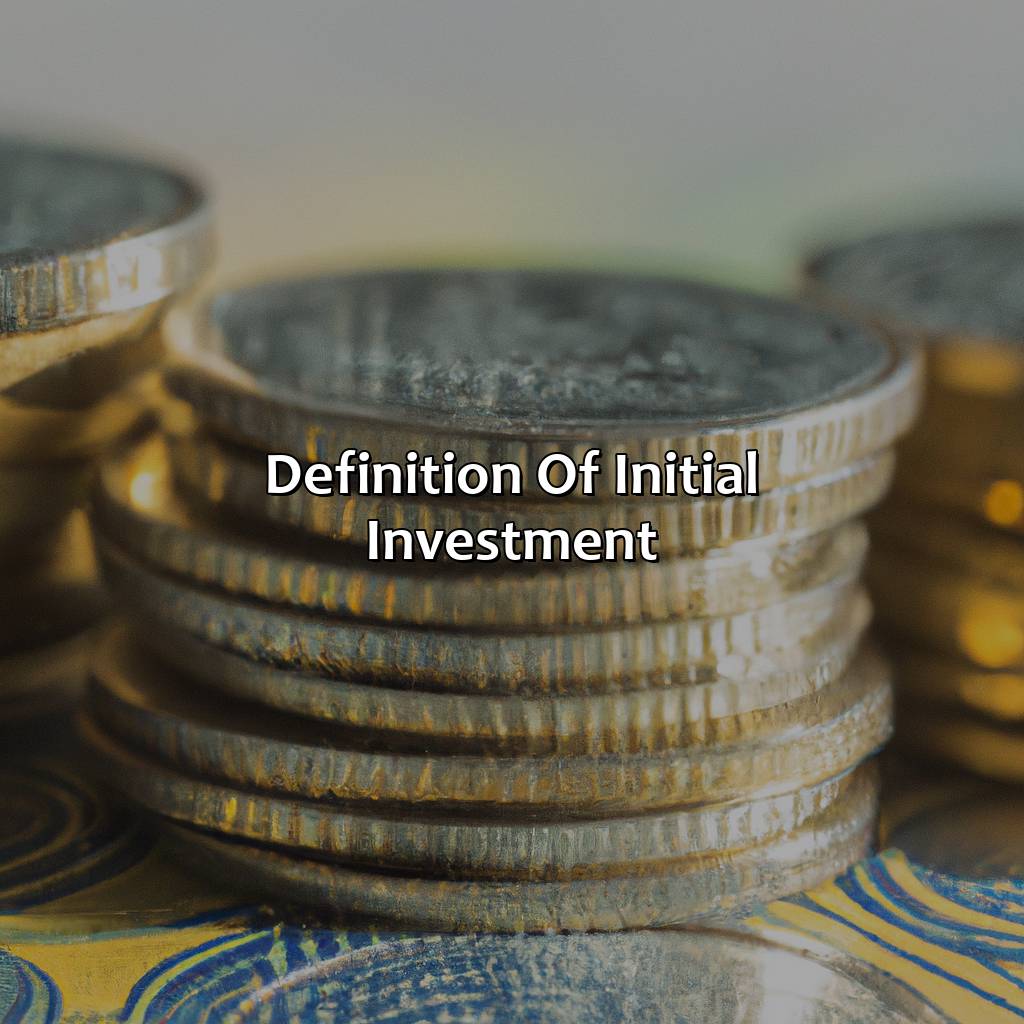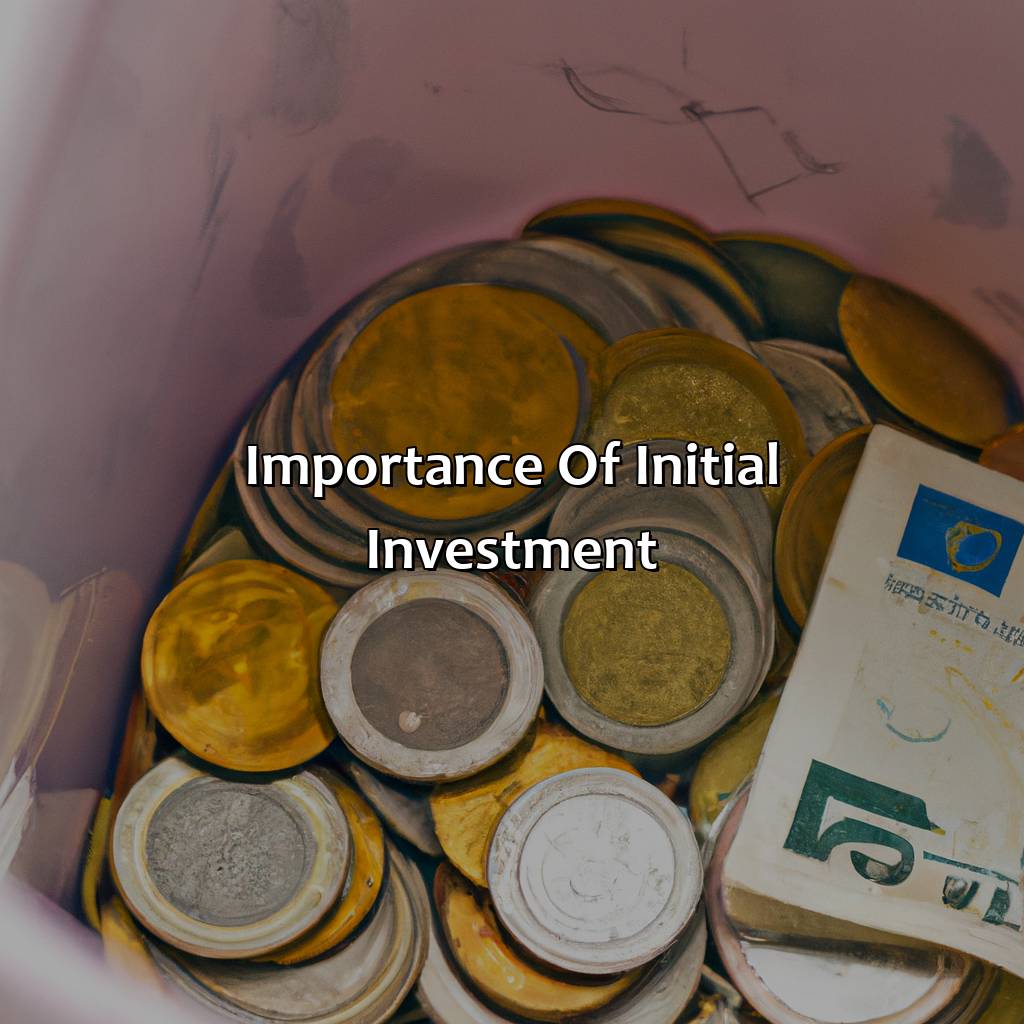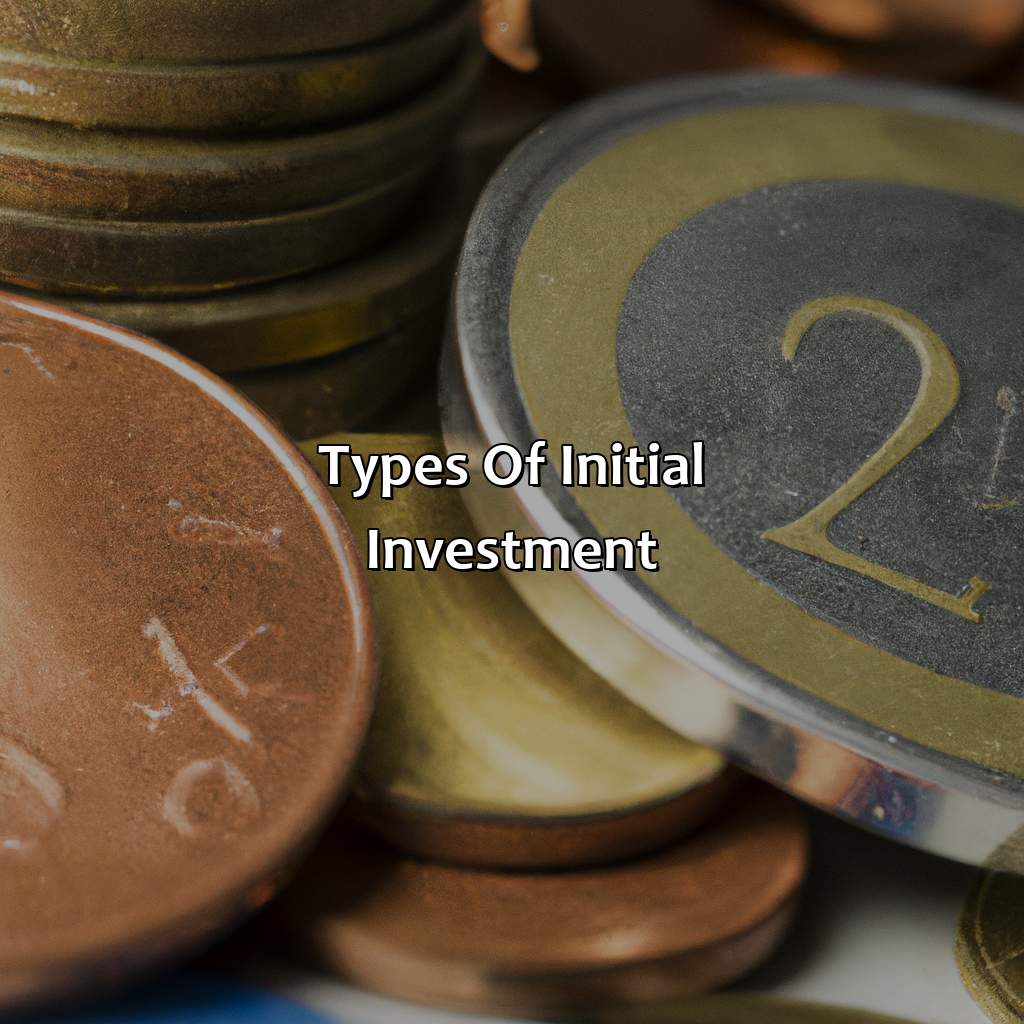What Is Initial Investment?
Key Takeaway:
- Initial investment refers to the money that is required to start a business or investment project. It can include expenditures such as research and development costs, equipment, inventory, and office space rent.
- The importance of initial investment lies in providing the necessary funding for business startups and investing for future return on investment. It can also help attract additional funding from investors and lenders.
- There are different types of initial investments, including seed capital, venture capital, angel investors, and crowdfunding. Each type has its own set of advantages and disadvantages, and should be carefully considered based on the specific needs and goals of the project.
- Before making an initial investment, it is important to assess the risks, conduct market analysis, and establish an exit strategy. These factors can help ensure that the investment is successful and contributes to the long-term growth and profitability of the project.
Are you unsure what initial investment means and how it works? Don’t worry, we’ll guide you through the basics so you can be better informed for your business venture. You’ll learn what it involves and how it can help you succeed.
Definition of Initial Investment
Initial Investment refers to the amount of money or capital that is required to start a new project or business. This investment is made in fixed assets, stocks, and any other necessary expenses. It sets the foundation for the growth and success of a business.
Investors and entrepreneurs must carefully analyze the investment requirements before starting any project. The amount of initial investment depends on a variety of factors, such as the nature of the business, expected returns, and market trends. Proper planning and budgeting can help reduce the amount of initial investment required.
Moreover, a solid understanding of the business’s requirements can allow investors to make informed decisions and prioritize expenses. Depending on the project, some investments may take years to yield returns, while others can provide a quicker return on investment.
To reduce initial investment costs, investors can consider investing in technology and innovative solutions. Technology can help automate processes, reduce overheads, and increase efficiency, making the business more profitable in the long term.

Image credits: retiregenz.com by Harry Washington
Importance of Initial Investment
Comprehend the need for initial investment for business startups and investing for future return on investment as a solution. These two sub-sections are important for understanding how vital initial investment is for a company’s success. Funding for startups can give a robust base, while investing for future ROI can lead to long-term progress. Let us look closer at these two sub-sections to appreciate their importance.

Image credits: retiregenz.com by Adam Woodhock
Funding for Business Startups
Starting a new business? Capital is essential! Entrepreneurial seed funding enables startups to carry out necessary research, arrange for office space, gather resources, and seek other opportunities. Whether you are looking to bootstrap the business yourself, or bring in third-party investors, finding the initial capital is a crucial step towards creating a viable venture.
Investment sources come in many forms — from personal savings accounts to grants from government agencies or private foundations. Generally referred to as ‘Seed Capital’, they provide enough money upfront to launch your new business concept. Though there are complexities to access funds like waiting for months before receiving support or going through an approval process.
It is important that you determine the nature of your entrepreneurial idea and what type of funding would be appropriate for it. Creating detailed projections/goals can help convince investors of the potential return on their investment.
Without adequate startup capital and management of expenses with strong decision-making skills, Startups could experience underfunding issues later on along with missed development milestones leading up to failed ventures. Remember, It’s not just about getting that investment but utilizing those financial resources wisely can make all the difference in early-stage startups’ fate.
Put your money where your future self will thank you, not where your current self wants to party.
Investing for Future ROI
Investing for a profitable tomorrow: Understanding the significance of initial investment is key to securing future returns. It involves allocating funds towards ventures that generate income with potential for growth. This requires attention to detail while assessing risk factors involved in various markets, before making informed decisions.
A well-thought-out initial investment can pave the way for long-term gains, even in volatile markets. To maximize return on investment (ROI), it’s crucial to consider all possibilities and implications prior to committing funds. One must weigh ROI against risk as lower risks often yield lower returns. Additionally, constant monitoring and evaluation help ensure investments remain consistent and viable.
In today’s uncertain economic climate, settling for low interest savings accounts isn’t sufficient. Establishing a diverse portfolio with potentially higher yields is essential to capitalize on opportunities that arise throughout the year. Failing to invest now could lead to missed gains down the line.
Don’t allow the fear of investing or lack of knowledge hinder you from growing your wealth. Seek expert guidance or do ample research before making any commitments. Strive towards a long-term vision of financial stability and liberty by investing smartly today!
From stocks to real estate, initial investments come in different shapes and sizes, just like the regrets of not investing early enough.
Types of Initial Investment
Investors and entrepreneurs have various options. Check out Seed Capital, Venture Capital, Angel Investors, and Crowdfunding. These are great choices for initial investment. Get to know more about them!

Image credits: retiregenz.com by Joel Jones
Seed Capital
Investment made at the initial stage of a business is commonly referred to as the ‘pre-business investment’. This type of investment is usually made before any revenue generation. In particular, Seed Capital is an initial form of pre-business investment that is used to cover the primary expenses in starting a business. It can be seen as the first building block of any startup company.
Seed capital is considered as one of the essential stages in raising funds for your business. Obtaining seed capital proves that there was already an initial interest and commitment in making your newly established business grow successfully. Initially, Seed Capital could come from Savings, Family and Friends and possibly Angel Investors or Venture Capitalist.
It should be noted that often seed capital can be quite minimal or substantial depending on the nature of each specific project’s requirements; this will depend on factors such as market potentials, capital intensity and time frames for profitability, each a factor as to whether more or less finance may be needed.
Most businesses started through Seed Capital significantly determines their fate. Investment teams have been known to monitor seeds funded startups closely with many denying funding beyond the seed stage if KPIs aren’t met.
The origin story behind seed funding features Bill Gates who got help from his mother when he needed $50,000 at Microsoft’s early stage. Today, he holds one of the most robust portfolios globally luring him among other billionaire investors because of his unique experience through fundraising challenges, reminiscent of those recommended by emerging entrepreneurs striving during their startup stages.
Ready to pitch your business idea to a venture capitalist? Just make sure it’s not another version of Uber for laundry.
Venture Capital
Investment by venture capitalists is known as a form of financing typically provided to startups and early-stage companies that have potential for high growth. This funding comes in the form of equity investments where the investor, also known as a VC, takes an ownership stake in the business, hoping to earn a return on investment when the company becomes profitable or is acquired. Venture capital funding often involves large sums of money and is considered high risk/high reward.
Venture capitalists typically invest in businesses with innovative products or services, disruptive technologies, or unique business models. They provide not only funding but also guidance and expertise to help grow the business. In exchange for their investment, venture capitalists receive equity ownership in the company, which allows them to participate in decision-making processes concerning the direction of the business.
The process of securing venture capital funding involves presenting a detailed plan that outlines how the company plans to expand and what it needs to achieve its goals. Startups must demonstrate their ability to execute their business plan while delivering strong financial returns. The competition for venture capital can be intense, requiring startups to differentiate themselves from other companies vying for funding.
To improve your chances of obtaining venture capital funding for your startup, consider building relationships with investors over time before seeking investment. Also, focus on building a strong team with relevant experience and industry knowledge who can execute your vision efficiently.
Angel investors may have wings, but they won’t hesitate to clip yours if you don’t have a solid initial investment plan.
Angel Investors
Investors who provide an extensive amount of capital in the early stages of a business industry are known as Benefactor Financiers. These investors give an opportunity to startups that have a high potential for growth but need industry-specific guidance, mentorship and initial funding. In return to their investment, they get an ownership interest in the company and shares in exchange for their capital.
Benefactor Financiers look for businesses with a strong value proposition, distinct selling point and innovative ideas. They involve themselves deeply in the company’s operations by offering expansive guidance and connections that can help the startup thrive. One significant advantage of this type of investment is receiving multiple sources for advice and mentorship that could boost business productivity effectively.
These financiers seek profitable returns on their investment. To secure deals and gain ownership stakes in companies shows confidence and builds interpersonal relationships with entrepreneurs which is highly beneficial when it comes to the future success of any business.
Suppose initial revenues do not settle investor commitments, negative situations may arise which often leads to disagreements between entrepreneurs and investors. In such a case, it is recommended to maintain a clear understanding of each other’s roles and responsibilities from the outset while creating transparent communication bonds to avoid misunderstandings.
This kind of financing can change healthy disputes into learning experiences if managed correctly with patience, transparency, respect for opinions, and constructive perspectives throughout its lifecycle.
Instead of begging for spare change on the street, just start a crowdfunding campaign for your initial investment needs.
Crowdfunding
One way to invest in a business venture is through the semantic NLP variation of ‘Crowdfunding’, which involves collecting small amounts of funding from individuals online. This method allows businesses to raise capital by reaching out to the public and leveraging their networks to gain support. It’s a popular method for entrepreneurs looking to turn their innovative ideas into reality, providing access to capital that may not be available through traditional investment channels.
Investors in crowdfunding typically receive equity or rewards in return for their contribution, such as early access to products or services. The process is facilitated by crowdfunding platforms that connect entrepreneurs with potential investors and provide tools for marketing and fundraising. However, due diligence is essential before investing in crowdfunding, as there may be risk involved.
Crowdfunding has been successful in financing various types of projects, including artistic endeavors, social causes, and business startups. Additionally, it provides an alternative investment option for those who want to diversify their portfolio and support emerging businesses.
Some tips for a successful campaign include creating a compelling pitch with clear goals and rewards, leveraging social media platforms and personal networks, and providing updates on progress regularly. By utilizing crowdfunding as an initial investment option, entrepreneurs can bring their ideas to life while building a supportive community around their business.
In one instance, a startup jewelry brand utilized crowdfunding to raise funds for its launch. The brand exceeded its funding goal within 24 hours of launching the campaign, showcasing the power of using this investment model as an initial step towards success.
Before investing initially, remember: measure twice, invest once, and always check for hidden landmines.
Factors to consider before investing initially
Before investing in any trade, check out three things:
- Risk Assessment
- Market Analysis
- Exit Strategy
This can help you steer clear of costly mistakes and maximize profits from your investment.

Image credits: retiregenz.com by Yuval Duncun
Risk Assessment
A thorough analysis of potential hazards, their impact on investment and ways to minimize them is a crucial step in making decisions. It is important to evaluate the risk-reward ratio, calculate financial goals and understand market trends before investing. Evaluating political, economic fluctuations and competition dynamics as well as technical and operational risks must be included in risk assessment.
Keeping in mind that all investments carry some degree of risk, the key is to identify the type of risks involved like market risk, inflationary Risk or currency risks etc. The good investor evaluates the overall economic strength of an investment before investing. An ideal investment should have a consistent track record with reduced deviation and high returns. By conducting proper research, analyzing the risks involved and identifying warning signs can help investors avoid potential loss.
It’s advisable to avoid putting all eggs in one basket while diversifying investments into multiple channels or industries. That helps reduce risks associated with individual companies (diversifiable risk). Understanding portfolio allocation, hedging techniques can help manage central non-diversifiable risks such as macros-instability or industry decline among others.
A $1 investment made by a stockbroker named Louis Engel in 1950s has become an incredibly wise decision for him today. He invested this amount in Berkshire Hathaway bought four shares from Buffett’s Partnership Ltd which has now soared about $24 million today expanding Louis into a millionaire. The best lesson learnt is that investing small amounts are always wiser so you won’t regret later while you learn from your initial mistakes.
Market Analysis is like trying to predict the weather – you can gather data, but you never really know what’s going to happen until it’s too late.
Market Analysis
Before investing, it’s essential to analyze the marketplace carefully. Through Business Environment Analysis, factors such as market size, growth potential, competition level, and consumer behavior can be examined. This can help investors make informed decisions and develop strategic plans to maximize their returns.
By analyzing various industry trends and regulatory policies through a Regulatory Environment Analysis, investors can also avoid potential legal issues down the line. Additionally, a Technical Environment Analysis can provide insights into technological advancements and future innovations expected or necessary for respective markets.
Furthermore, conducting a SWOT (Strengths, Weaknesses, Opportunities, Threats) analysis of a company or product in question offers an evaluation of internal and external factors influencing the venture’s performance and ultimately guides investment decisions.
For instance, after thorough business research on e-commerce platforms like Amazon and Alibaba Group Holding Limited through SWOT analysis—one may decide to invest in either based on cost-benefit analysis weighing influencers such as brand reputation against geographical penetration.
Leaving the party early may not be cool, but having an exit strategy for your investments is always a good idea.
Exit Strategy
When it comes to planning your financial portfolio, having a well-thought-out strategy to exit your investments is crucial. A sound ‘withdrawal plan’ can help you maximize gains and manage risks by determining the right time and way to sell your holdings.
To begin with, be clear about what you want to achieve and how long you plan to hold your investment. Are you seeking a quick profit or long-term appreciation? Based on the answer, consider setting specific targets that align with your goals and formulate strategies that allow for flexibility.
- Review market conditions regularly, keep an eye on macroeconomic trends, and adjust your exit strategy accordingly.
- Use technical analysis tools like moving averages or stop-loss orders as triggers to take action when prices fall too low or hit record highs.
Furthermore, diversifying your holdings across asset classes or geographies can mitigate volatility risk, so sourcing expert advice or using automated robo-advisor platforms might be worthwhile if you’re uncertain about how best to allocate capital at different stages of growth.
Overall, while an effective exit strategy may not guarantee success for every investment, it sets up the parameters for achieving satisfactory results over time.
Five Facts About Initial Investment:
Initial investment refers to the amount of money needed to start a business or investment venture. (Source: Investopedia)
The amount of initial investment required varies depending on the type of business or investment. (Source: The Balance Small Business)
Initial investment can come from personal savings, loans, or investments from others such as angel investors or venture capitalists. (Source: Forbes)
The initial investment is critical because it determines how much capital a business has to operate and grow in its early stages. (Source: Small Business Administration)
As with any investment, it is important to carefully consider the potential risks and returns before making an initial investment decision. (Source: The Motley Fool)
FAQs about What Is Initial Investment?
What is initial investment?
Initial investment refers to the amount of money that an individual or business invests at the beginning of a project or business venture. It is the initial capital required to start and run the business until it becomes profitable.
Why is initial investment important?
Initial investment is important because it determines the success or failure of a business. It sets the foundation for the business and ensures that it has the necessary resources to get off the ground. It is the money used to purchase equipment, inventory, pay salaries and expenses, and cover other operational costs.
How do I calculate initial investment?
To calculate initial investment, you will need to make a list of all the expenses you will incur when starting your business. This includes things like office space, equipment, legal fees, licenses, and permits. You should also consider your operational expenses such as salaries, rent, utilities, insurance, and marketing costs. Add up all of these costs to determine your initial investment.
What are the sources of initial investment?
The sources of initial investment can come from a variety of places, including personal savings, loans from banks or lending institutions, investments from family and friends, and venture capital from investors. Crowdfunding campaigns have also become a popular way for entrepreneurs to raise initial investment.
Can initial investment be recovered?
Yes, initial investment can be recovered through profits generated by the business. Once the business becomes profitable, the revenues generated can be used to pay off any loans or debts and also provide a return on investment for the business owner or investors who contributed the initial investment.
What happens if I don’t have enough initial investment?
If you do not have enough initial investment, you may have to delay the start of your business or consider other financing options such as borrowing money from family and friends or finding investors who are willing to contribute to your business. However, it is important to ensure that you are not taking on too much debt that may ultimately harm your business in the long run.
 Checkout this IRS Loophole
Checkout this IRS Loophole 
